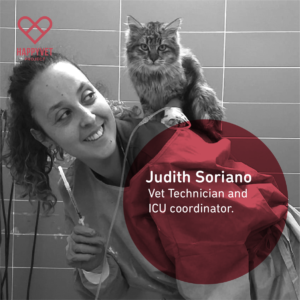 Judith Soriano, veterinary technician
Judith Soriano, veterinary technician
Judith is the coordinator of hospitalization and intensive care in a reference vet hospital in Barcelona. In fact, she has always worked in large ICU’s, with large teams. Countless critical animals have passed through her precise hands and those who have worked with her describe her as caring, serene, efficient and an outstanding co-worker.
” This profession requires a lot of teamwork, so much so that you sometimes neglect the individual. If a colleague is having a bad day, and you notice it, you should stop and ask them how they are.”
What led you to become a vet technician?
The love of animals. I had always wanted to be a veterinarian since I was little, but for different reasons I couldn’t pursue that degree. I did a vet tech course and when I did my internship I realised that what I really enjoyed was taking care of animals. In the veterinary world there always has to be someone to diagnose and someone to care. When I finally started working at the same place where I did my internship I realized that the clinical and diagnostic part did not motivate me, but I loved the care part.
What difference in profiles do you find between veterinarians and assistants?
The veterinarian wants to diagnose and provide solutions to the problems that arise. On the other hand, the assistant focuses on patient management. We are the most human part of dealing with the patient, which the vet often loses a little because it is impossible to get involved as much as he would like to, also to safeguard himself. After all, vets want to cure and if they don’t succeed, they suffer a lot emotionally. The helper, on the other hand, pursues the same goal, but if nothing can be done to cure patients, at least they can give them comfort.
What is the hardest part of your job?
When you don’t manage to stabilise the patient, make them pain-free or get them to go home with their owner. You always think “this time it will be different, I can do things a bit better”. When you finally don’t succeed, it is inevitable to get frustrated about it. However, the fact that I try to do the best job I can by doing my best daily is what comforts me in the end.
And what is the most psychologically draining for you?
Those weeks when you have critical patients one after the other and you don’t manage to save any of them… it’s very hard, very frustrating because you think that all the effort has been for nothing. Also, the fact of communicating something so serious to the families generates a lot of helplessness because you want to be able to console them and understand them in the best way possible.
What less positive synergies are there on a daily basis that affect the team?
In the healthcare world there is always a lot of stress since you cannot plan your work. There is a sense of order until there is an emergency (or several!) and that’s when you may lose your temper. It is in those moments of stress that bad behaviour between colleagues can occur. The real problem comes when people don’t know how to manage a bad atmosphere created by that specific moment of chaos.
Do you remember an episode that illustrates what you are saying?
I was in a tense moment when a colleague had bad-mouthed me, but I was still doing my job, draining an abdominal fluid. Suddenly, someone tripped, and that tray of abdominal fluid ended up on top of someone. The stress that was in the air ended up generating laughter and everybody forgot everything that had gone before. For this to happen, the work group must be very powerful both emotionally and mentally. You should not help to generate toxic circles. You have also to understand that there are going to be some tense and serious moments where it might get a little too tense, but then there will be laughter. Everything will relax so we all get along well with each other. A common refrain is “if it wasn’t for these (fun/ridiculous) moments it wouldn’t be worth it”.
What else contributes to toxic relationships in veterinary teams?
Unfortunately, this happens more often than we would like. On top of the complexity of our work, if there is a lot of pressure on the team for results, turnover, etc., this can create a continuous atmosphere of competition and strain. After all, we are talking about professions that are very closed to the outside world where intense relationships are formed between co-workers. Your private life gets mixed up with your professional life and your environment is always the same. You get into a vicious circle of meeting the same people you work with and talking about work all the time, perpetuating the cycle. That’s why it’s very helpful to go out with these people to share an extra activity that has nothing to do with the profession.
What could be done better, individually, to relieve overall team’s pressure?
You said it yourself. This profession requires a lot of teamwork, so much so that you sometimes neglect the individual. If a colleague is having a bad day, and you notice it, you should stop and ask them how they are. Even if that person is very reserved, they will appreciate the gesture and your words. And when things go well, everyone likes positive reinforcement, and we should also be able to encourage that individually through positive words: “we have organised ourselves very efficiently and we are doing good”.
We should also stop from time to time to think about ourselves, how we are doing and how we are feeling. We should not allow ourselves to get into a spiral of frustration where you feel that every day you go to work unmotivated and with a headache. In certain situations, we should assess how content we really are and see how we can get out of that downward spiral where we don’t feel 100% well.
Do you think that emotional fatigue affects vets and technicians or nurses differently?
I think that in the end we end up carrying also the vet’s fatigue in a way. When you see your veterinary partner exhausted, trying to solve several complex cases at the same time, you feel very bad for him/her, and you always offer to help and put in extra hours. This is coupled with our low job recognition, when for example a client does not acknowledge you, despite your efforts and knowing that you have carried twice the load.
How do you look after yourself and the team you coordinate?
I learned to separate. I also started to study to understand what was going on and to figure out if, medically, I had done everything I could. I have been trained a lot to be able to know when a certain patient coming through the door will not have a good outcome and why. When you understand what’s going on, you deal with it differently. As for the team, among other things I try to organise the breaks in such a way that everyone can stop, rest and eat at the appropriate time. Sometimes they tell me that it is too early and they are not hungry yet, but there is a big difference between eating at one o’clock and eating at seven o’clock in the afternoon.
And what could veterinarians do to take better care of their assistants and nurses?
In many countries, this profession does not have a well-defined role because it is very pluralistic, as we can range from answering the phone to assisting in the surgery room. And this is misleading. In this case, the key would be to understand that both roles are interrelated and not in competition with each other. The veterinarian could then collaborate by calling for the officialization of the profession with approved training and reinforce the assistant’s deserved job repositioning. If you extrapolate the functions of the veterinary assistant to humans, we find ourselves in the nursing profession. The problem is that many times fellow vets do not see you as such, sometimes we want to offer more, to study, to train… and end up not being allowed to and that also generates a lot of frustration. Moreover, if we had our own agenda, it would take a lot of workload away from the veterinarian and would reinforce our position and our respective work weight in the eyes of the sector and society in general.
What do you feel about the veterinary field?
I think this profession is very nice and deep down there are not many negative things about it. Animals are very grateful and their care is extremely valuable because they are helpless and don’t understand what is happening to them. If you were in a hospital on another planet with strange people with whom you couldn’t communicate because you don’t speak the same language, you would probably react in the same way as the most fearful and aggressive animal.
How do you see yourself in a few years’ time?
Professionally, I see myself growing a little bit more. I want to keep working and nurturing myself because I feel I’m in the right place at the right moment. I think my profession is progressing at a good pace and I also feel very valued. These last few years I have gained a lot because I have managed to have time for myself and to dedicate myself to hobbies that keep me happy. Personally, I want to finish fitting all the pieces of my life into place by increasing my family.
ER chill vibes
Long surgery mornings…







